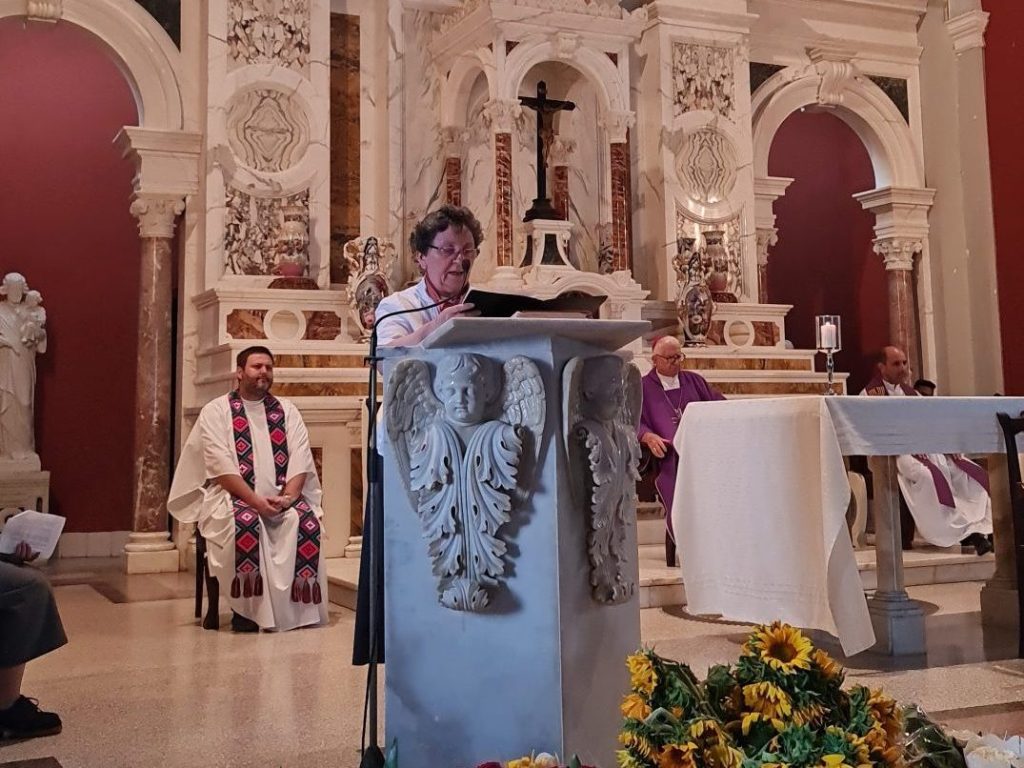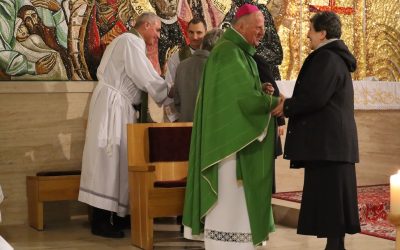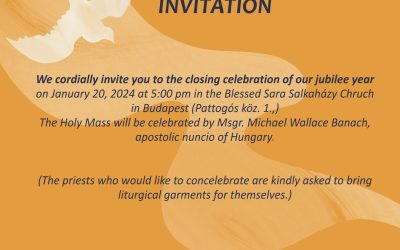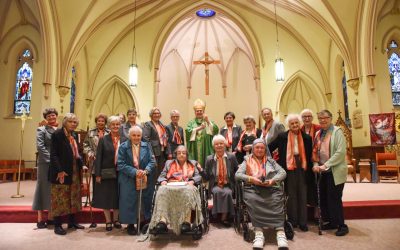Estamos con gran gratitud en nuestros corazones aquí, en las raíces del Distrito Cubano al conmemorar el centenario de nuestra fundación. En la fecha actual, 12 de mayo, cada grupo de hermanas aquí en Cuba recordará el acontecimiento en sus propias ciudades, pero ahora nos hemos reunido como distrito y agradecemos a mons. Dionisio Guillermo Garcia Ibañez, Arzobispo de Santiago de Cuba por celebrar con nosotras aquí en El Cobre. Como señaló el Papa Francisco en el discurso que nos dirigió, sólo podemos renovarnos en nuestro carisma si permanecemos fieles a nuestras raíces; por eso comenzamos la serie de celebraciones en la Abadía Benedictina de Pannonhalma, volviendo a nuestras raíces benedictinas, y por eso estamos aquí ahora, en la Basílica de El Cobre, el lugar donde las Hermanas Sociales comenzaron su misión en Cuba.

Hace cien años nació el carisma de las Hermanas Sociales. ¿Qué es un carisma? ¿Cómo nace una comunidad? El carisma de una comunidad religiosa es un don de Dios: un don dado en un momento determinado a una persona, que será decisiva en el inicio de la comunidad -la fundadora, o las fundadoras-, pero el mismo don se da a todos los miembros que son llamados por Dios a unirse a ella. El carisma es algo vivo, está vivo y se recrea en todos y cada uno de los miembros de la comunidad. Además, un carisma no es sólo un don concedido a un único grupo de seguidores, sino que es un don de Dios concedido a la Iglesia universal.
Cada carisma expresa un pensamiento único de Dios, una manera única en la que Dios quiere estar presente para su pueblo a través de ese carisma concreto.
Existe este carisma de las hermanas sociales dado a un grupo de mujeres valientes en Hungría en la década de 1920. ¿Cómo terminó aquí en Cuba, en el otro extremo del mundo? Sucedió así, porque fue dado no sólo a un grupo en Hungría, no sólo a la iglesia en Hungría, sino a la iglesia universal, y porque a través de este carisma Dios quiso estar presente en este país, para este pueblo de esta manera particular.
Detengámonos un momento en el deseo de Dios: Dios quiso y quiere también hoy estar presente para el pueblo de Cuba a través de este carisma particular de las hermanas sociales. Guardemos un breve momento de silencio: Pido a mis hermanas que consideren las formas en que Dios estuvo presente para el pueblo cubano a través de su ministerio; y pido a las personas aquí presentes que consideren cómo Dios ha estado presente para ellos a través de la presencia y el ministerio de las hermanas. Damos gracias a Dios por sus obras a través de este carisma.
Por los misteriosos caminos de Dios una mujer, la Hna. Nicoleta llega a Cuba para quedarse con su hermano, un sacerdote salesiano mientras espera sus visas para seguir viajando. Y a través de ella la semilla de este carisma fue plantada aquí en este país; y encontró un suelo fértil, y el árbol cubano de las hermanas sociales creció de esa semilla aquí, en El Cobre, y desde entonces continúa extendiéndose por todo el país, y continúa trayendo nuevas ramas. Se podría decir que este es un grupo muy pequeño; el Santo Padre también nos preguntó cuántos somos en el mundo, y su respuesta a los números pequeños fue: pequeñas pero fuertes. Sí, en efecto, fuertes somos, pero no en el sentido en que el mundo define la fuerza, sino en el modo en que Dios define la fuerza: “Dios eligió lo que el mundo tiene por necio, para confundir a los sabios; lo que el mundo tiene por débil, para confundir a los fuertes; (1 Cor 1,27)…”
Aquí estamos, pequeñas pero fuertes en la gracia de Dios, cumpliendo su deseo de estar presentes para su pueblo en Cuba, para transmitir su compasión, su amor sanador y sustentador a su pueblo.
Se nos ha encomendado una tarea seria y un desafío: seguir las huellas de nuestros predecesores significa defender la Verdad, la verdad del Verbo Divino, con nuestro valentía, con presencia profética, con la coherencia que nos impone la fe. Y, al mismo tiempo, buscar respuestas a los problemas sociales con el corazón de Dios, con espíritu de misericordia y de compasión; esto es lo que significa la caridad social, esto es lo que significa caminar en la misión del amor santificante de Dios; porque en el corazón de Dios hay lugar para todos, nadie está excluido – el Santo Padre lo repitió varias veces con énfasis – “tutti”- todos, debe haber lugar para todos en nuestro amor.
Para mantener unidas en nosotras la palabra profética y el corazón misericordioso, necesitamos ser transformadas en el amor de Dios. Esta es la lección mas importante de la escuela del Señor en nuestra espiritualidad benedictina: morum conversio, la tarea permanente de la conversión continua del corazón. Sin esta transformación no se puede cumplir la misión que se nos ha confiado, la misión del amor santificante de Dios.
Nuestro ejemplo y maestra para vivir esta misión es nuestra hermana Sara. Que su determinación, su amor apasionado por nuestro Señor y el compromiso implacable con el amor incondicional llenen nuestros corazones para que podamos vivir nuestro carisma de las hermanas sociales y cumplir nuestra misión como ella lo hizo. Queremos avanzar hacia la siguiente fase de nuestra historia y seguir cumpliendo el deseo de Dios de estar presente para su pueblo aquí en Cuba aferrándonos al lema de hermana Sara – “Estoy aquí, enviame” – , y ahora con corazones magnánimos dirigirnos a nuestro Dios de esta manera: Señor, estamos listas; Ecce adsumus, mitte nos. Estamos aquí, envía nos, Señor.
-*-
With great gratitude in our hearts we are here at the roots of the Cuban District as we commemorate the centennial of our founding. On the actual date of the foundation, May 12, each local community here in Cuba will remember the event in their own cities, but now we have all gathered together as a district and we thank Msgr. Dionisio Guillermo Garcia Ibañez, Archbishop of Santiago de Cuba for celebrating with us here in El Cobre. As Pope Francis pointed out in his address to us, we can only renew ourselves in our charism if we remain faithful to our roots; that is why we began the series of celebrations at the Benedictine Abbey of Pannonhalma in Hungary, returning to our Benedictine roots, and that is why we are here now, in the Basilica of El Cobre, the place where the Society of the Sisters of Social Service began their mission in Cuba.
This charism of the Sisters of Social Service was born one hundred years ago. What is a charism? How is a community born? The charism of a religious community is a gift from God: a gift given at a given time to a person, who will have a decisive role in starting a community – the foundress, or foundresses; but the same gift is given to all the members who are called by God to join the respective community. The charism is something alive; it is alive and is being recreated in each and every one of the members of the community. Moreover, a charism is not only a gift given to a single group of followers, but it is a gift of God given to the universal Church.
Each charism expresses a unique thought of God, a unique way in which God wants to be present to his people through that particular charism.
Now there is this charism of the Sisters of Social Service given to a group of courageous women in Hungary in the 1920’s. How did it end up here in Cuba, in the other corner of the world? It happened this way, because it was given not only to a group in Hungary, not only to the Church in Hungary, but to the universal church, and because through this charism God wanted to be present in this country, for this people in this particular way.
Let us pause now for a moment to reflect on God’s desire: God wanted and still wants today to be present to the people of Cuba through this particular charism of the Sisters of Social Service. Let us take a brief moment of silence: I ask my sisters to consider the ways in which God has been present to the Cuban people through their ministry; and I ask the people present here to consider how God has been present to them through the presence and ministry of the sisters. Let us give thanks to God for his works through this charism.
Through the God’s mysterious ways a woman, Sister Nicoleta arrived in Cuba to stay with her brother, a Salesian priest while waiting for her visas to continue traveling. And through her the seed of this charism was planted here in this country; and it found fertile soil, and the Cuban tree of Society of the Sisters of Social Service sprung up from that seed here in El Cobre, and since then it spread throughout the country, and continues to bring new branches up to the present day. One could say that this is a very small group; the Holy Father also asked us how many of us are in the world, and his remark to the small numbers was: “small but strong.” Yes, indeed, strong we are, but not in the sense in which the world defines strength, but in the way God defines strength: “God chose the foolish of the world to shame the wise, and God chose the weak of the world to shame the strong; …”(1 Cor 1:27)
Here we are, small but strong in God’s grace, fulfilling his desire to be present to his people in Cuba, to transmit his compassion, his healing and sustaining love to his people.
We have been entrusted with a serious task and a challenge: to follow in the footsteps of our predecessors means to defend the Truth, the truth of the Divine Word, with courage, with prophetic presence, with the coherence that faith imposes on us. And, at the same time, to seek answers to social problems with the heart of God, with a spirit of mercy and compassion; this is what social love means, this is what it means to walk in the mission of God’s sanctifying love; because in the heart of God there is room for everyone, no one is excluded – the Holy Father repeated it several times with emphasis – “tutti” – everyone, there must be room for everyone in our love.
To keep together the prophetic word and the merciful heart within us, we need to be transformed in the love of God. This is the most important lesson of the Lord’s school in our Benedictine spirituality: morum conversio, the permanent task of the ongoing conversion of the heart. Without this transformation we cannot fulfill the mission entrusted to us, the mission of God’s sanctifying love.
Our example and teacher in living this mission is our sister Sara. May her determination, her passionate love for our Lord and her unrelenting commitment to unconditional love fill our hearts so that we can live our SSS charism and fulfill our mission as she did. We want to move into the next phase of our history and continue to fulfill God’s desire to be present to his people here in Cuba by holding on to Sister Sara’s motto – “Here I am, send me” – and now with magnanimous hearts we address our God in this same way: Lord, we are ready; Ecce adsumus, mitte nos. We are here, send us, Lord.




